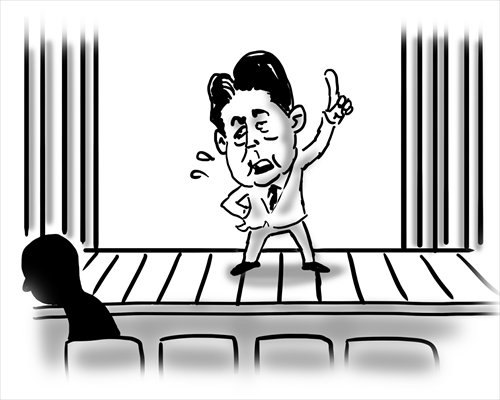Abe’s global goals distract from real needs

Illustration: Shen Lan/GT
In a recent interview with Nikkei and the Financial Times, Japanese Prime Minister Shinzo Abe showed his determination to make an impact on the global political stage, a target rarely set by a Japanese leader since the end of WWII. In addition to frequent overseas visits and chair of the G7 summit, Abe is seeking other means to make its mark.
Traditionally the focus of Japan's foreign relations rests on its ally US and neighboring countries, some of which seemingly have been included in Abe's global stage plan.
He repeatedly called for improving relations with Russia, and proposed to visit Moscow before the G7 summit. He even called for the G7 to retake in Russia. In late 2015, Tokyo and Seoul reached a startling deal on the "comfort women" issue, which is considered to have removed one of the biggest barriers in bettering Japan-South Korea ties.
But Abe's global ambition goes far beyond the neighboring countries. In the interview, Abe implied his hopes to improve Japan's ties with Russia so as to play a role in resolving questions such as the tension between Iran and Saudi Arabia, the Syria issue and the Islamic State.
He also showed strong concerns over the South China Sea, which is distant from Japan. This is nothing unexpected given Abe's repeated concerns on China's moves in the waters. What's surprising is his comments that the notion of China and the US controlling the Asia-Pacific is "an outdated way of thinking."
Whether the future of the Asia-Pacific is dominated by China and the US, Abe's words can be taken as Japan's desire to contest for regional leadership. And the last time Japan expanded its clout to the whole region was during WWII.
After that, Japan has been trying to deal with its foreign relations within the framework of the US-Japan alliance and never sought regional leadership in any form alone.
If determined to strengthen Japan's presence in the South China Sea, Abe may first send Japanese Self-Defense Forces (SDF) to conduct reconnaissance that targets China in the South China Sea or even join the US Navy's patrols. He conveyed this message to US President Barack Obama at the APEC summit in November.
Abe also found another way to enhance Japan's presence in the South China Sea. In November, Japan's foreign and defense ministers visited Australia to secure a deal on selling submarines to Australia, and one of the reasons cited to facilitate the cooperation is China's growing military might.
Canberra has long planned to purchase submarines from other countries, which Tokyo is keen on. The Japanese government even agrees to transfer some technology to Australia in a bid to defeat German and French competitors.
If sealed, the contract will signify not only business cooperation, but also a de facto military alliance built between the two countries. Based on the attitudes by the two ministers, if Japan is awarded the contract, the new alliance may become a fresh force in the South China Sea.
However, so far Abe's global strategies haven't worked out well.
Russian Foreign Minister Sergey Lavrov recently said that Japan should realize it has no authority to make claims to the Northern Territories. The "comfort women" deal has also stirred heavy criticism in South Korea.
In the South China Sea, soon after Abe's remarks at APEC, the Japanese government disputed that it had plans to take military moves in the waters, and Abe later also changed his attitude. This hints that there is strong opposition to Abe's adventurous plan within the Japanese government.
In fact, Japan's government officials and politicians have been reluctant to be too much involved in waters that are not vital for Japan and they prefer the traditional alliance where the US takes on a military leadership role.
Canberra has not made the final decision on the submarine bid, but there are domestic voices calling for discretion in Japan-Australia alliance.
"Under the guise of the defense-of-Australia doctrine, Canberra has long rejected any pre-commitments beyond the explicit demands of the ANZUS Treaty," wrote Mark Thomson, senior analyst for defense economics at the Australia Strategic Policy Institute. Even if Japan wins the contract, it may find its partner not as keen on the South China Sea as Japan is.
On Middle East issues, Abe so far has not taken any real actions. The region is not one where Japan should get involved hastily without crucial interests, unless Tokyo wants to be a target in potential terrorist attacks.
All in all, Abe should firstly figure out a more realistic and constructive strategy to deal with Japan's relations with neighboring countries, despite his ambitions on the global stage.
The author is a lecturer at the School of History, Wuhan University. opinion@globaltimes.com.cn